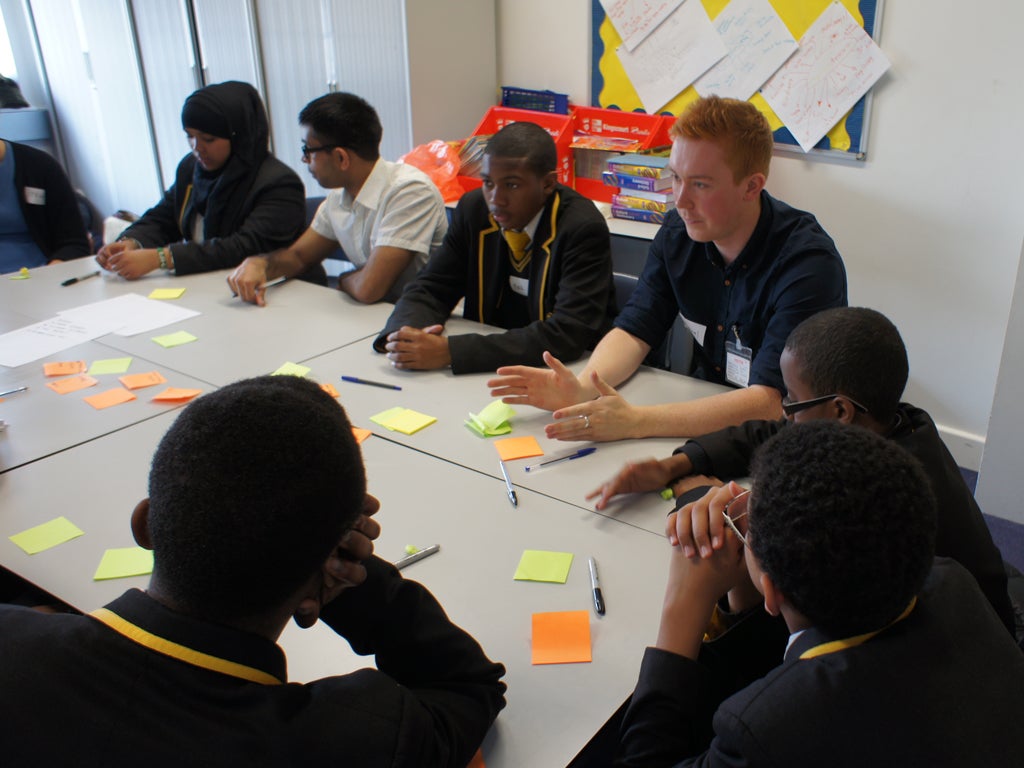Young, dumb and disenfranchised: Why we should look to the next generation to build a better Britain
Instead of ignoring them, we should listen to poor inner city kids' ideas. Michael Simpson, a graduate fellow at social enterprise Year Here, does just that

It’s difficult to escape the stereotypical images of the youth of today. Be they the hooded, rioting vandal, or the internship-addled, penniless graduate – they don’t really inspire us with confidence in the next generation of social and political leaders. With a stagnant economy fuelling youth unemployment, at near 1m across the UK, even those of us with jobs can be excused for a gloomy outlook.
Using our lives and careers to improve society for others, when our generation is clearly in dire straits, seems like naïve idealism, doesn’t it?
I’m part of a graduate fellowship run by Year Here – a social enterprise that challenges entrepreneurial young people to a year of tackling social issues in their own backyard. We volunteer in some of the poorest communities in London and have a go at coming up with inventive solutions to some of the big social issues of the day. It’s only been a couple of months but it’s refreshing to see a faith in our collective ability to renew the impetus driving social change.
But what good could the brash and unpolished ideas of youngsters possibly do anyway?
The cellist Yo Yo Ma once said that ‘the professional musician should aspire to the state of the beginner’. When we inhibit the instincts of the beginner – naïve questions, fresh perspectives and a sense of possibility – we stagnate. The society we live in today seems to be stifled by bureaucracy. We make incremental amendments to the crumbling foundations of old solutions rather than adopting fundamentally new approaches to how we live, work, learn and care for each other. Our generation must, as Steve Jobs said, ‘shake off this erroneous notion that life is there and you’re just gonna live in it, versus embrace it, change it, improve it, make your mark upon it'.
But, sadly, a dose of youthful thinking is not the panacea for all of society’s ills; the difficulties facing British society are huge. The population over the age of 75 is set to double in the next 30 years and 60 per cent of older people in the UK agree that age discrimination exists in their daily lives. At the other end of the age spectrum, the link between low family income and poor educational attainment is greater in Britain than in almost any other developed country. Whether it’s the ageing population, stagnant social mobility or the rise in lifestyle-related diseases, real social and political change isn’t quick, easy or clean – thousands of public sector professionals, charity workers and politicians work on these issues every day and yet they remain stubbornly entrenched.
The Year Here philosophy is to understand a problem before you attempt to solve it. Having volunteered at Hatch End High School in Harrow as part of the fellowship, I’ve discovered all sorts of unexpected things about educational disadvantage – like how discipline at the school is difficult to oversee because the architectural setup creates hidden cracks and crevices. It is only when you walk the hallways of the place that you really begin to gain the tacit knowledge and insight crucial to overcoming the hurdles that stand between us and a fairer and more effective society.
Society’s big problems are tough, gritty and difficult to shift, and many of them affect our generation directly. Despite the difficulties, the onus is on us to combine our fresh perspectives with a desire to understand the lives of others, hunger to learn the ropes of ‘social innovation’ and a bit of Jobs-style audacity and entrepreneurialism. If not us, who? And if not now, when?
Michael is a 2013 Year Here Graduate fellow currently volunteering at Hatch End High School. He recently graduated from Manchester University with first-class honours in American history, politics and literature. Follow him on Twitter.
Subscribe to Independent Premium to bookmark this article
Want to bookmark your favourite articles and stories to read or reference later? Start your Independent Premium subscription today.

Join our commenting forum
Join thought-provoking conversations, follow other Independent readers and see their replies